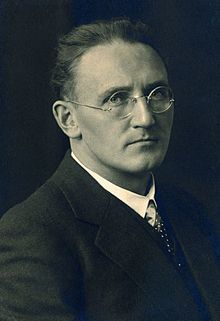Hermann Scherchen

Hermann Scherchen (21 June 1891 in Berlin – 12 June 1966 in Florence) was a German conductor.
Life
Scherchen was originally a violist and played among the violas of the Bluthner Orchestra of Berlin while still in his teens. He conducted in Riga from 1914 to 1916 and in Königsberg from 1928 to 1933, after which he left Germany in protest at the Nazi regime and worked in Switzerland. Along with the philanthropist Werner Reinhart, Scherchen played a leading role in shaping the musical life of Winterthur for many years, with numerous premiere performances, the emphasis being placed on contemporary music. From 1922 to 1950 he was the principal conductor of the city orchestra Winterthur (today known as Orchester Musikkollegium Winterthur)[1]
Making his debut with Schoenberg's Pierrot Lunaire, he was a champion of 20th century composers such as Richard Strauss, Webern, Berg and Varèse, and actively promoted the work of younger contemporary composers including Xenakis and Nono.
He was the teacher of Marc Bélanger, Françoys Bernier, and Karl Amadeus Hartmann, and contributed to the libretto of Hartmann's opera Simplicius Simplicissimus. He also premiered Hartmann's early work Miserae. The conductor Francis Travis was a pupil, then conducting assistant, for five years.
He is probably best known for his orchestral arrangement (and recording) of Johann Sebastian Bach's The Art of Fugue. Another notable achievement is his 1958 recording of Beethoven's Eroica symphony for the Westminster label (subsequently reissued on compact disc), containing what is still (as of 2006) the fastest first movement ever recorded and the closest to Beethoven's own, problematic, metronome mark. [1] [2] His 1953 "Lehrbuch des Dirigierens" ("Treatise on Conducting" ISBN 3-7957-2780-4) is a standard textbook. His recorded repertoire was extremely wide, ranging from Vivaldi to Reinhold Glière.
Like Vasily Safonov and (in later life) Leopold Stokowski, Scherchen commonly avoided the use of a baton.[2] His technique when in this mode sometimes caused problems for players; an unidentified BBC Symphony Orchestra bassoonist told the singer Ian Wallace that interpreting Scherchen's minuscule hand movements was like trying to milk a flying gnat.[3] According to Fritz Spiegl[4], Scherchen worked largely through verbal instructions to his players and his scores were peppered with reminders of what he needed to say at each critical point in the music.
However, Scherchen did not always dispense with the baton. The film of his rehearsal of his edition of Bach's 'Art of Fugue' with the CBC Toronto Chamber Orchestra shows him using a baton throughout, and very effectively.
Family
After a brief marriage to actress Gerda Müller, Scherchen married Chinese composer Xiao Shuxian. A daughter, Tona Scherchen, was born to them in 1938. She has also made a name for herself as a composer. His last wife was Pia Andronescu, with whom he had 5 children.
He was survived by a number of children, from five wives and other women.[5]
One his sons was Wolfgang "Wulff" Scherchen. Wulff's six-year relationship with Benjamin Britten started when he was aged thirteen. John Bridcut describes the passionate exchanges of letters between the famous composer and the young boy in Britten's Children.
His daughter, Myriam Scherchen, runs a record label Tahra which produces historic recordings on CD devoted to famous conductors, including Scherchen himself.
His sister Helen was married to the Hungarian cartographer Sándor Radó.
Quote
- "Music does not have to be understood. It has to be listened to."
Recordings
Scherchen recorded an unusually wide range of repertoire, from the baroque to the contemporary. His Mahler recordings, made before Mahler became a part of the standard repertoire, were especially influential; so too were his recordings of Bach and Handel, which helped pave the way for the period-performance practice movement. Included as well were significant recordings of music by Haydn, Beethoven, Berlioz, Tchaikovsky, Glière, Bartók, Schoenberg and many others.
In 1960 Hermann Scherchen recorded works of Max Reger with alto Margarete Bence and the Nordwestdeutsche Philharmonie, including Eine Lustspielouvertüre (Comedy Overture), Serenade for orchestra, Romantic Suite for orchestra, An die Hoffnung, Variations and Fugue on a Theme of Beethoven and Variations and Fugue on a Theme of Mozart.[6]
In 1996 Tahra published the only commercially released recording of Malipiero's complete L'Orfeide. It was a remastered live recording of the 7 June 1966 performance at the Teatro della Pergola in Florence, conducted by Scherchen only five days before his death. The cast included Magda Olivero and Renato Capecchi (Tah 190/191).[7]
Notes
- ^ The Musikkollegium Winterthur Orchestra
- ^ Boulez, Pierre (1995). The Boulez-Cage Correspondence. Cambridge University Press. p. 162. ISBN 0521485584.
{{cite book}}: Unknown parameter|coauthors=ignored (|author=suggested) (help) - ^ Story told by Wallace during the BBC radio panel game My Music, 1993
- ^ Spiegl, Fritz: Music Through the Looking Glass (London, 1984)
- ^ Michael H. Kater, The Twisted Muse
- ^ "Scherchen conducts Reger". classical.net. Retrieved 22 July 2010.
- ^ Manfriani, Franco, Mito e contemporaneità, Edizioni Pendragon, 2007, pp. 35-36. ISBN 8883425472
- J.S. Bach - Art of Fugue. Orchestre de Radio Beromunster. Hermann Scherchen, 1949. (History label - Soli Deo Gloria, 204583-308. Two CDs, 2000.)
- Ludwig van Beethoven - Symphony No. 5, Opus 67. Orchestra della Radio Televisione della Svizzera Italiana (RTSI), February 1965. (CD1 contains the full rehearsal version and CD2 the full concert version.) Ermitage ERM 126-2 ADD.
External links
- [3] Dissertation - Performance, Technology, And Politics: Hermann Scherchen's’ Aesthetics Of Modern Music by Dennis Hutchison
- Online biography at bach-cantatas.com
- [4] Discography - The Recordings of Hermann Scherchen by Lawrence Friedman
